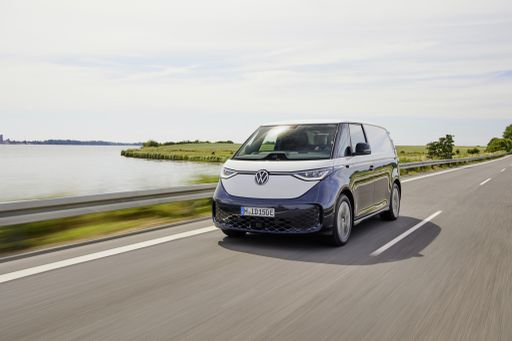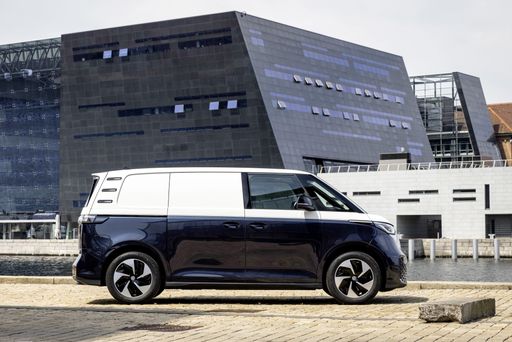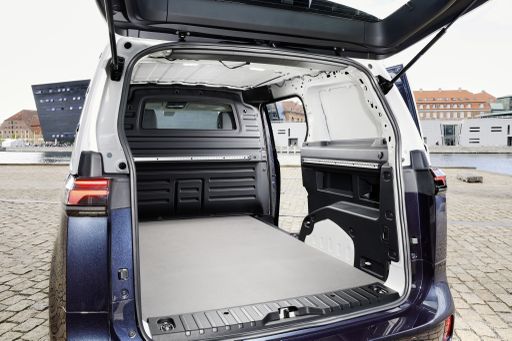Ford Transit Transporter vs VW ID. Buzz Cargo - Differences and prices compared
Costs and Efficiency:
Looking at overall running costs, both models reveal some interesting differences in everyday economy.
Ford Transit Transporter has a barely noticeable advantage in terms of price – it starts at 39900 £, while the VW ID. Buzz Cargo costs 43600 £. That’s a price difference of around 3631 £.
In terms of energy consumption, the advantage goes to the VW ID. Buzz Cargo: with 19.20 kWh per 100 km, it’s somewhat more efficient than the Ford Transit Transporter with 21.30 kWh. That’s a difference of about 2.10 kWh.
As for range, the VW ID. Buzz Cargo performs clearly perceptible better – achieving up to 455 km, about 138 km more than the Ford Transit Transporter.
Engine and Performance:
Under the bonnet, it becomes clear which model is tuned for sportiness and which one takes the lead when you hit the accelerator.
When it comes to engine power, the VW ID. Buzz Cargo has a distinct edge – offering 340 HP compared to 269 HP. That’s roughly 71 HP more horsepower.
In terms of top speed, the VW ID. Buzz Cargo performs clearly perceptible better – reaching 160 km/h, while the Ford Transit Transporter tops out at 120 km/h. The difference is around 40 km/h.
There’s also a difference in torque: VW ID. Buzz Cargo pulls clearly perceptible stronger with 679 Nm compared to 430 Nm. That’s about 249 Nm difference.
Space and Everyday Use:
Beyond pure performance, interior space and usability matter most in daily life. This is where you see which car is more practical and versatile.
Seats: Ford Transit Transporter offers decisively more seating capacity – 6 vs 3.
In curb weight, Ford Transit Transporter is barely noticeable lighter – 2074 kg compared to 2264 kg. The difference is around 190 kg.
In maximum load capacity, the Ford Transit Transporter performs significantly better – up to 14100 L, which is about 10200 L more than the VW ID. Buzz Cargo.
When it comes to payload, Ford Transit Transporter significantly takes the win – 2607 kg compared to 753 kg. That’s a difference of about 1854 kg.
Who wins the race?
The Ford Transit Transporter proves to be performs better in key areas and therefore becomes our DriveDuel Champion!
Ford Transit Transporter is the better all-rounder in this comparison.
 @ Ford Motor Company / Ford Media Center
@ Ford Motor Company / Ford Media Center
Ford Transit Transporter
Costs and Consumption
View detailed analysis
Engine and Performance
View detailed analysis
Dimensions and Body
View detailed analysis
Ford Transit Transporter
The Ford Transit is the no-nonsense workhorse that turns heavy-duty hauling into a surprisingly civilized experience, with a cabin that favors practicality over pretense. It’s the go-to for tradespeople and fleet managers who want reliability, adaptability and low running headaches — not showy gimmicks.
details @ Ford Motor Company / Ford Media Center
@ Ford Motor Company / Ford Media Center
 @ Ford Motor Company / Ford Media Center
@ Ford Motor Company / Ford Media Center
 @ Ford Motor Company / Ford Media Center
@ Ford Motor Company / Ford Media Center
VW ID. Buzz Cargo
The VW ID. Buzz Cargo marries retro Volkswagen charm with a thoroughly modern electric work van, offering a surprisingly spacious and practical load area wrapped in friendly, iconic styling. It's a smart pick for urban tradespeople and small businesses who want quiet, effortless driving, lower running costs and easy maneuverability — with a healthy dash of nostalgia on the job.
details @ Volkswagen AG / VW Media
@ Volkswagen AG / VW Media
 @ Volkswagen AG / VW Media
@ Volkswagen AG / VW Media
 @ Volkswagen AG / VW Media
@ Volkswagen AG / VW Media
 @ Ford Motor Company / Ford Media Center
@ Ford Motor Company / Ford Media Center
|
 @ Volkswagen AG / VW Media
@ Volkswagen AG / VW Media
|
|
|
|
Costs and Consumption |
|
|---|---|
|
Price
39900 - 69100 £
|
Price
43600 - 51400 £
|
|
Consumption L/100km
7.9 - 10.3 L
|
Consumption L/100km
-
|
|
Consumption kWh/100km
21.3 - 32 kWh
|
Consumption kWh/100km
19.2 - 20.3 kWh
|
|
Electric Range
247 - 317 km
|
Electric Range
330 - 455 km
|
|
Battery Capacity
68 kWh
|
Battery Capacity
59 - 79 kWh
|
|
co2
0 - 270 g/km
|
co2
0 g/km
|
|
Fuel tank capacity
70 L
|
Fuel tank capacity
-
|
Dimensions and Body |
|
|---|---|
|
Body Type
Cargo Van
|
Body Type
Cargo Van
|
|
Seats
3 - 6
|
Seats
3
|
|
Doors
4
|
Doors
4
|
|
Curb weight
2074 - 2765 kg
|
Curb weight
2264 - 2510 kg
|
|
Trunk capacity
-
|
Trunk capacity
-
|
|
Length
5531 - 6704 mm
|
Length
4712 mm
|
|
Width
2059 mm
|
Width
1985 mm
|
|
Height
2530 - 2778 mm
|
Height
1932 mm
|
|
Max trunk capacity
9300 - 14100 L
|
Max trunk capacity
3900 L
|
|
Payload
735 - 2607 kg
|
Payload
640 - 753 kg
|
Engine and Performance |
|
|---|---|
|
Engine Type
Diesel, Electric
|
Engine Type
Electric
|
|
Transmission
Manuel, Automatic
|
Transmission
Automatic
|
|
Transmission Detail
Manual Gearbox, Automatic Gearbox, Reduction Gearbox
|
Transmission Detail
-
|
|
Drive Type
Front-Wheel Drive, Rear-Wheel Drive, All-Wheel Drive
|
Drive Type
Rear-Wheel Drive, All-Wheel Drive
|
|
Power HP
105 - 269 HP
|
Power HP
170 - 340 HP
|
|
Acceleration 0-100km/h
-
|
Acceleration 0-100km/h
-
|
|
Max Speed
120 km/h
|
Max Speed
145 - 160 km/h
|
|
Torque
310 - 430 Nm
|
Torque
310 - 679 Nm
|
|
Number of Cylinders
4
|
Number of Cylinders
-
|
|
Power kW
77 - 198 kW
|
Power kW
125 - 250 kW
|
|
Engine capacity
1996 cm3
|
Engine capacity
-
|
General |
|
|---|---|
|
Model Year
2019 - 2024
|
Model Year
2024
|
|
CO2 Efficiency Class
G, A
|
CO2 Efficiency Class
A
|
|
Brand
Ford
|
Brand
VW
|
What drivetrain options does the Ford Transit Transporter have?
Available configurations include Front-Wheel Drive, Rear-Wheel Drive or All-Wheel Drive.
The prices and data displayed are estimates based on German list prices and may vary by country. This information is not legally binding.
